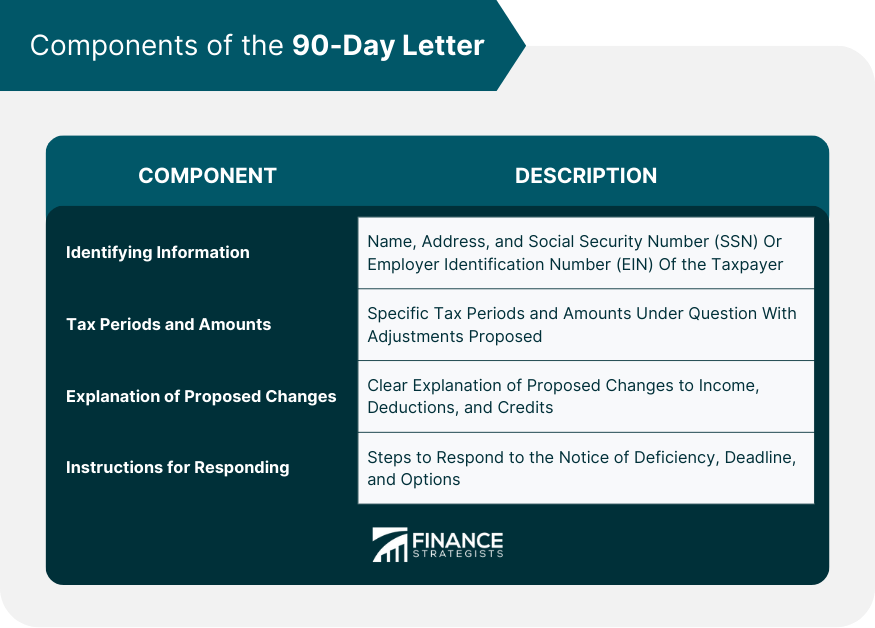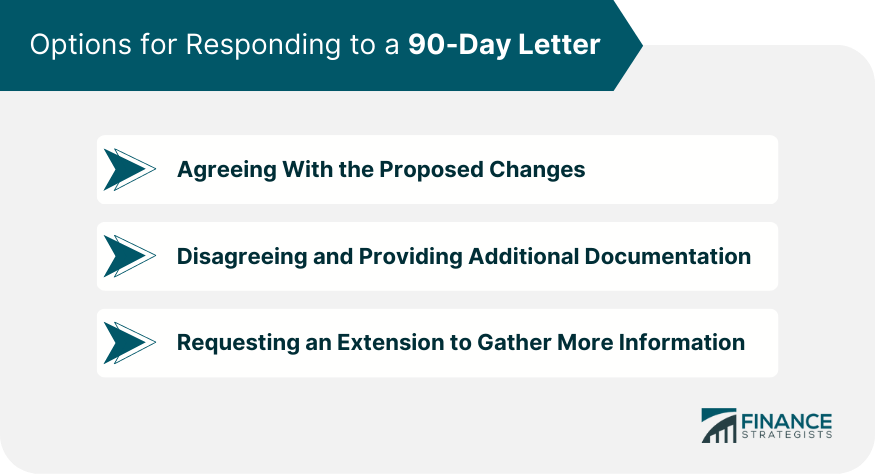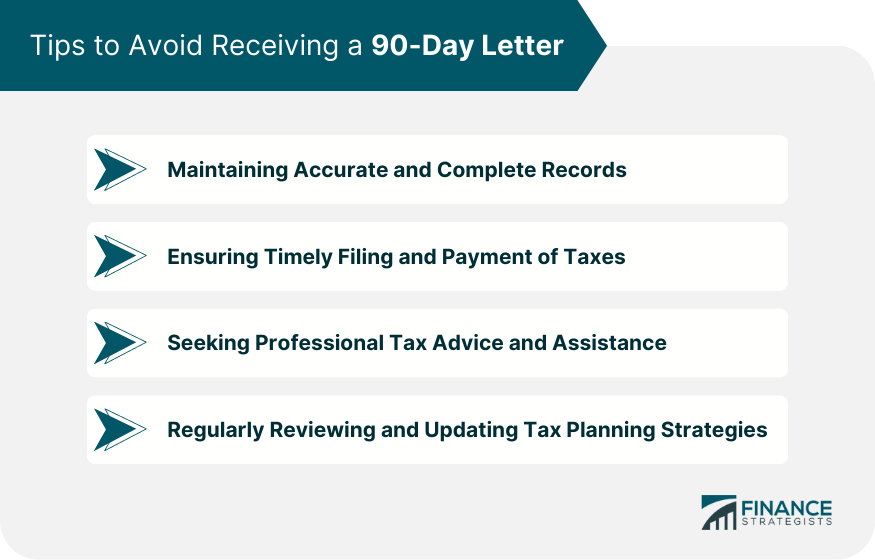The 90-Day Letter, also known as a Notice of Deficiency, is a letter sent by the Internal Revenue Service (IRS) to taxpayers in the United States. This letter is sent when the IRS proposes changes to a taxpayer's income, credits, or deductions that result in additional taxes owed. The 90-Day Letter is so named because it gives the taxpayer 90 days to either agree to the proposed changes and pay the additional tax or dispute the changes by filing a petition with the Tax Court. If the taxpayer does not respond within 90 days, the IRS will assess the additional tax and begin collection efforts. This letter is an important legal notice, and it's crucial to respond in a timely manner to protect your rights and avoid potential penalties and interest. If you receive a 90-Day Letter, consult a tax professional to understand your options and the best course of action. A 90-Day Letter typically includes the taxpayer's name, address, and Social Security number (SSN) or Employer Identification Number (EIN). This information is vital for taxpayers to verify that the letter is meant for them and not sent in error. The letter will specify the tax periods and amounts under question. It will detail the adjustments made, including increases or decreases in the tax liabilities, credits, and deductions. This section helps the taxpayer understand the specific changes proposed by the IRS and the reason for these changes. The 90-Day Letter will explain the proposed changes to the tax return, which could include amendments to income, deductions, and credits. This section is crucial for taxpayers, allowing them to review the changes and determine whether they agree or disagree with the IRS's proposed adjustments. The letter will outline the steps the taxpayer needs to follow to respond to the Notice of Deficiency. It will specify the deadline for responding and the options available to the taxpayer, such as agreeing with the changes, providing additional documentation to support their position, or requesting an extension to gather more information. One common reason for receiving a 90-Day Letter is errors or discrepancies in the tax return. This could include mathematical errors, incorrect filing status, or misinterpreting tax laws. Taxpayers should carefully review their tax returns before submission to avoid such issues. Another reason for receiving a 90-Day Letter is underreported income. The IRS may detect discrepancies between the income reported on a taxpayer's return and those reported by employers, financial institutions, or other sources. In such cases, the IRS will issue a 90-Day Letter proposing adjustments to the taxpayer's income and tax liability. Taxpayers who claim deductions or credits without sufficient documentation or proof may receive a 90-Day Letter. The IRS may disallow these deductions or credits if they determine that the taxpayer needs to provide more evidence to support their claims. Misclassification of income or expenses can also trigger a 90-Day Letter. For example, if a taxpayer incorrectly classifies personal expenses as business expenses, the IRS may disallow these deductions and propose adjustments to the tax return. Taxpayers have 90 days from the date of the Notice of Deficiency to respond. This deadline is critical, as failure to respond within this timeframe may result in the IRS assessing the proposed changes and initiating collection actions. Taxpayers have several options when responding to a 90-Day Letter: If the taxpayer agrees with the changes proposed by the IRS, they should follow the instructions provided in the letter to accept the adjustments and make any necessary payments. Responding promptly, even if agreeing with the changes, is essential to avoid any penalties or interest. If the taxpayer disagrees with the proposed changes, they can provide additional documentation and evidence to support their position. This could include receipts, invoices, bank statements, or any other relevant records. The taxpayer should also include a written explanation detailing their disagreement with the IRS's proposed adjustments. If the taxpayer requires more time to gather information and documentation to support their position, they can request an extension. The IRS may grant an extension if the taxpayer can demonstrate reasonable cause for the delay. Failure to respond to a 90-Day Letter can have severe consequences for taxpayers. The IRS may assess the proposed changes, and the taxpayer will lose their right to dispute the adjustments. Additionally, the IRS may initiate collection actions, such as wage garnishments, bank levies, or tax liens, to recover unpaid tax liabilities. If the taxpayer disagrees with the proposed changes and provides supporting documentation, the IRS may reconsider its position. If the IRS still maintains the adjustments, the taxpayer has the option to appeal the decision through the IRS's administrative appeal process. The taxpayer must submit a written protest detailing their disagreement and provide any additional evidence to support their position. The Taxpayer Advocate Service (TAS) is an independent organization within the IRS that helps taxpayers resolve disputes and problems with the IRS. Taxpayers who are experiencing difficulties in resolving their 90-Day Letter issues can seek assistance from TAS. The service is free and confidential, and the TAS can help taxpayers understand their rights and navigate the dispute resolution process. If the taxpayer and the IRS cannot reach an agreement through the administrative appeal process, the taxpayer may consider taking their case to the United States Tax Court. Taxpayers should consult with a tax services attorney or tax professional experienced in tax litigation to evaluate their case and prepare for a potential court battle. One of the best ways to avoid receiving a 90-Day Letter is to maintain accurate and complete records of all financial transactions. This includes maintaining receipts, invoices, bank statements, and other documentation supporting income, deductions, and credits claimed on the tax return. Filing tax returns and making tax payments on time can help taxpayers avoid receiving a 90-Day Letter. Late filing or payment can trigger IRS scrutiny and increase the likelihood of receiving a Notice of Deficiency. Working with a tax professional or attorney can help taxpayers ensure that they correctly interpret and apply tax laws, which can help avoid receiving a 90-Day Letter. Tax professionals can also assist taxpayers in preparing accurate and complete tax returns, reducing the chances of errors or discrepancies that may trigger an IRS notice. Taxpayers should regularly review and update their tax planning strategies to ensure compliance with current tax laws and regulations. This can help prevent issues that may result in receiving a 90-Day Letter. The 90-Day Letter, also known as the Notice of Deficiency, is a communication sent by the IRS to taxpayers proposing changes to their tax return. It contains important components such as identifying information, tax periods and amounts in question, explanation of proposed changes, and instructions for responding. Common reasons for receiving a 90-Day Letter include errors or discrepancies in the tax return, underreported income, unsupported deductions or credits, and misclassification of income or expenses. Taxpayers have 90 days to respond, and they can choose to agree with the proposed changes, provide additional documentation to support their position, or request an extension. Not responding can lead to the IRS assessing the proposed changes and initiating collection actions. Disputes can be resolved through the administrative appeal process or with assistance from the Taxpayer Advocate Service. To avoid receiving a 90-Day Letter, taxpayers should maintain accurate records, file and pay taxes on time, seek professional tax advice, and regularly review and update tax planning strategies.What Is the 90-Day Letter?
Components of the 90-Day Letter
Identifying Information of the Taxpayer
Tax Periods and Amounts in Question
Explanation of the Proposed Changes to the Tax Return
Instructions for Responding to the 90-Day Letter

Reasons for Receiving the 90-Day Letter
Errors or Discrepancies in the Tax Return
Underreported Income
Unsupported Deductions or Credits
Misclassification of Income or Expenses
Responding to the 90-Day Letter
Timeline
Options for Responding
Agreeing With the Proposed Changes
Disagreeing and Providing Additional Documentation
Requesting an Extension to Gather More Information

Potential Consequences of Not Responding to the 90-Day Letter
Resolving Disputes
Administrative Appeal Process
Taxpayer Advocate Service Assistance
Potential Tax Court Case Preparation
Tips to Avoid Receiving the 90-Day Letter
Maintaining Accurate and Complete Records
Ensuring Timely Filing and Payment of Taxes
Seeking Professional Tax Advice and Assistance
Regularly Reviewing and Updating Tax Planning Strategies

Conclusion
90-Day Letter FAQs
A 90-Day Letter is a notice sent by the IRS to inform taxpayers of their intent to assess additional taxes. It gives the taxpayer 90 days to either agree to the proposed changes or file a petition with the Tax Court.
You received a 90-Day Letter from the IRS because they believe discrepancies in your tax return must be addressed. The letter warns that the IRS plans to assess additional taxes and penalties.
No, you cannot ignore a 90-Day Letter from the IRS. You must respond to the letter within the 90-day period, either by agreeing to the proposed changes or by filing a petition with the Tax Court.
If you don't respond to a 90-Day Letter from the IRS within the 90-day period, the IRS will assess the additional taxes and penalties as proposed in the letter. This can lead to a tax lien or wage garnishment, so it's important to respond to the letter in a timely manner.
Yes, you can negotiate with the IRS after receiving a 90-Day Letter. You can reach a settlement with the IRS through an offer in compromise or installment agreement. Working with a tax professional to help you navigate the negotiation process is important.
True Tamplin is a published author, public speaker, CEO of UpDigital, and founder of Finance Strategists.
True is a Certified Educator in Personal Finance (CEPF®), author of The Handy Financial Ratios Guide, a member of the Society for Advancing Business Editing and Writing, contributes to his financial education site, Finance Strategists, and has spoken to various financial communities such as the CFA Institute, as well as university students like his Alma mater, Biola University, where he received a bachelor of science in business and data analytics.
To learn more about True, visit his personal website or view his author profiles on Amazon, Nasdaq and Forbes.











